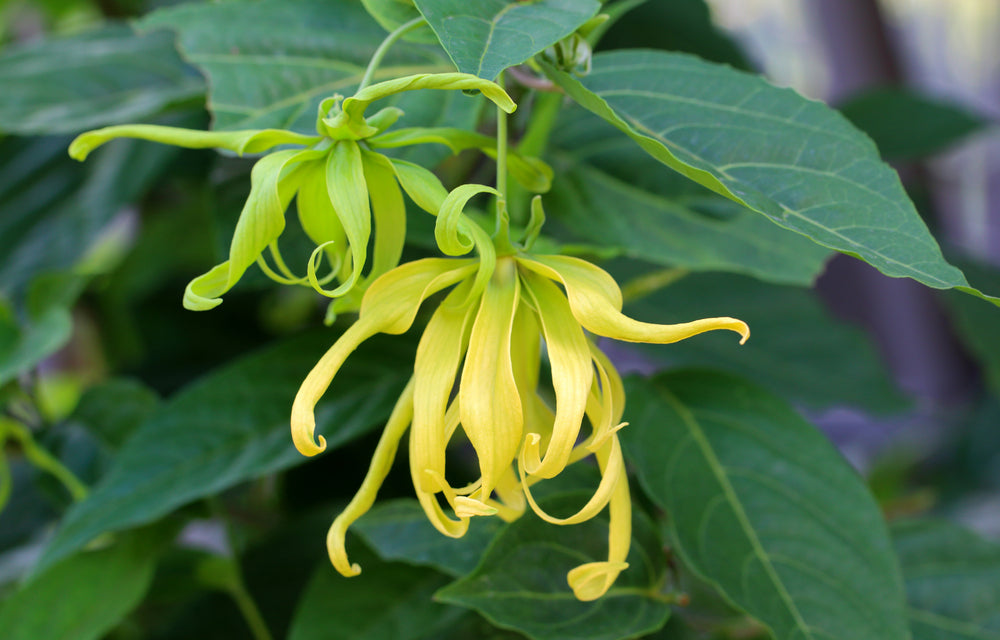What is Ylang Ylang Essential Oil made of?
Ylang Ylang Essential Oil is extracted through steam distillation from the flowers of the Cananga odorata, a tropical tree native to countries surrounding the Indian Ocean, like Indonesia, Philippines, and Polynesia.
The beneficial properties of Ylang Ylang Essential Oil can be attributed to its key compounds, including germacrene, caryophyllene, and farnesene. These compounds contribute to the oil's unique floral scent and various health benefits.
- Latin Name: Cananga odorata
- Main Country of Origin: Madagascar
- Scent Note Type: Base note with a sweet, exotic, and floral aroma
- Most Popular Usage: Aromatherapy and Perfumery
What are the benefits of using Ylang Ylang Essential oil?
Ylang Ylang Essential Oil offers a myriad of potential benefits:
- Mood Booster: The aromatic scent can help alleviate stress and anxiety.
- Promotes Healthy Skin: It helps to maintain skin moisture and oil balance.
- Hair Health: It is known to strengthen the hair and promote a healthier scalp.
- Aphrodisiac: In some cultures, it is used to stimulate romantic desires.
How to use Ylang Ylang Essential Oil?
- Aromatherapy: Add a few drops to a diffuser to create a calming and uplifting atmosphere.
- Topical Treatment: Mix it with a carrier oil and apply to the skin for its moisturizing benefits.
- Hair Care: Dilute a few drops in your preferred hair oil or conditioner to enhance hair strength and vitality.
How to combine Ylang Ylang Essential Oil with Carrier Oils
Ylang Ylang Essential Oil blends well with carrier oils like jojoba oil, almond oil, and coconut oil. Add 2-3 drops of Ylang Ylang Essential Oil to a tablespoon of your chosen carrier oil for topical use.
To create an aromatic diffuser blend, combine 4-5 drops of Ylang Ylang Essential Oil with the suggested amount of water in your diffuser.
Research based on Ylang Ylang Essential Oil
"Essential Oils from the Medicinal Herbs Upregulate Dopamine Transporter in Rat Pheochromocytoma Cells" (2017, www.hindawi.com): This study presents evidence that ylang ylang essential oil can upregulate dopamine transporter, suggesting its potential role in managing mood disorders.
"Aromatherapy and the central nerve system (CNS): therapeutic mechanism and its associated genes" (2013, www.ncbi.nlm.nih.gov): The study highlights the potential of ylang ylang essential oil in alleviating stress and depression by acting on the central nervous system.
"In vitro bioactivities of essential oils used for acne control" (2017, www.sciencedirect.com): This research paper demonstrates that ylang ylang oil exhibits antimicrobial activities against skin pathogens, suggesting its potential for acne control.
Frequently Asked Questions
Q: Is Ylang Ylang Essential Oil safe for all skin types?
A: Yes, generally, but it should be diluted with a carrier oil before application. A patch test is recommended for first-time users.
Q: Can I ingest Ylang Ylang Essential Oil?
A: It depends upon whether the manufacturer has produced the oil to be ingested or purely for topical and aromatic purposes. For example, Avivni's Ylang Ylang Essential Oil has organic and purity certifications, however, we still don't recommend ingesting essential oils without consulting a physician (or holistic physician) simply because every person's body reacts differently.
Q: Is Ylang Ylang Essential Oil safe for pets?
A: Essential oils should be used cautiously around pets, as they may be sensitive or allergic. Consult with a vet before introducing any new essential oil into your pet's environment.
Q: Can Ylang Ylang Essential Oil be used during pregnancy?
A: Pregnant or nursing women should always consult with a healthcare provider before using any essential oils.
Q: Does Ylang Ylang Essential Oil have a shelf life?
A: Yes, it's best to use it within 2-3 years of opening for optimal quality.

